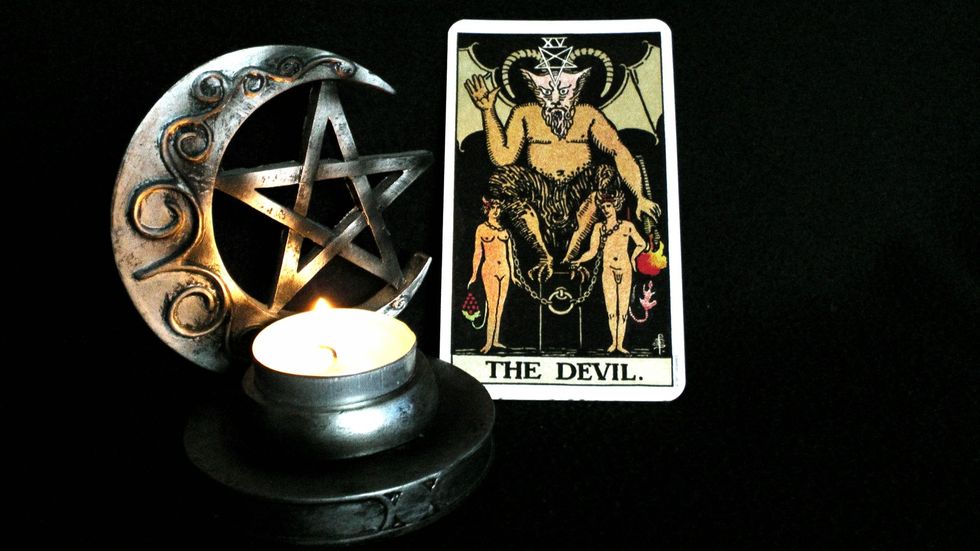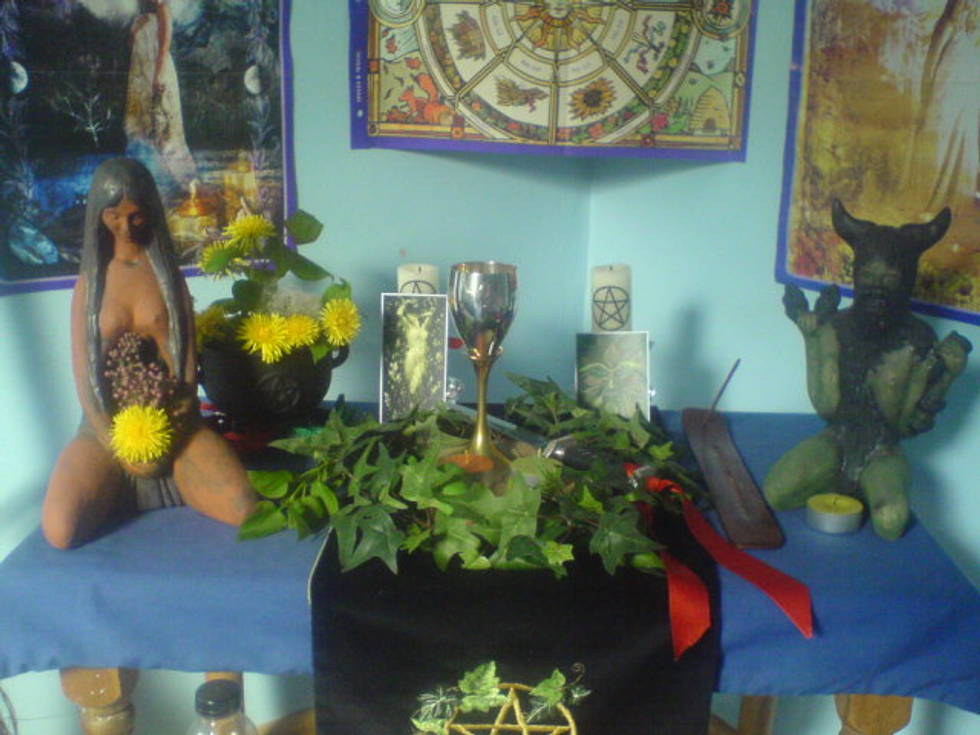I'll start by defining paganism: the word stems from the Latin word pagus (meaning "country district"), and then paganus (meaning "villager, rustic"). Christian Latin soon used the word pagan to refer to "heathens," and the modern meaning of the word refers to a person holding religious beliefs outside of the main world religions. As such, pagan religions tend to be indigenous, nature-based, and loosely-structured, the largest organizational structure often being a single congregation (or coven!). A disclaimer: I'm not a practicing pagan, just a shameless hipster working on her religious studies degree. The following list is of common categories of paganism, and is by no means exhaustive.
Wicca and modern witchcraft
A Welsh witch's altar to celebrate Beltane, a joyful holiday celebrating fertility and nature's harvest
Wicca is currently the largest form of Paganism, and is perhaps the best known. It's important to note two things: 1) all Wicca is pagan, but not all paganism is Wiccan, and 2) Wicca does not worship Satan as he's a Christian construct, and witchcraft is traditionally pre-Christian. It draws from ancient ideas of witchcraft, which are largely pantheist, meaning the belief that there is divinity in all living things. According to wicca.com, which is a large community for Wiccans but not an official authoritative organization:
"Wicca is a belief system and way of life based upon the reconstruction of pre-Christian traditions originating in Ireland, Scotland, and Wales. While much of the information of how our ancestors lived, worshipped and believed has been lost due to the efforts of the medieval church to wipe our existence from history, we try to reconstruct those beliefs to the best of our ability with the information that is available."
Even within the division of Wicca, there are many subgroups including Kemetic Wicca, or Kemetism, a contemporary revival of ancient Egyptian religion, and Dianic or feminist Wicca, which may form covens exclusively of women or lesbians. Practicing Wicca is highly individualistic, but there are many overarching traditions, including the celebration of eight main holidays (All Hallow's Eve and Winter Solstice may sound familiar), creating altars consisting of herbs, incense, candles, minerals, crystals, and idols of ancient Druidic, Roman, Greek, Egyptian, or Sumerian deities. As with most religions, its holidays center around the seasons and its ceremonies around life events such as birth, puberty, marriage, and death. There isn't necessarily a formal conversion process, though some may choose to go through an "initiation," where one may choose a different name for themself.
Goddess Spirituality (or the Goddess movement)
Depiction of Goddess Athena, the Greek goddess of war and wisdom
Many pagan traditions defy category when compared to one another, and as such, Dianic Wicca may also fall under this broad category of pagan practice. The Goddess movement was neo-pagan movement prominent in North America, Western Europe, Australia, and New Zealand the 1970s (and by no coincidence, it coincided with second-wave feminism). It seeks to subvert the traditions of largely (or completely) male-dominated Abrahamic religions by worshiping Goddess(es) and honoring femininity. As early as first-wave feminism (think the suffrage movement), there were writings on female deities by women like Elizabeth Cady Stanton, a notable American abolitionist and suffragette.
Though the movement gained modern momentum in Western cultures, it tends to go hand-in-hand with established polytheistic religions like Hinduism due to the pre-existence of female deities. One may similarly practice Greek, Druid, Roman, Nordic, Sumerian, or other ancient religions while emphasizing worship of female deities.
Ethnic Paganism
The still-standing Parthenon, a Greek temple dedicated to the Goddess Athena
As you've probably noticed, much of paganism is associated with ethnic and national identities. A list of common practices: Germanic (including the English-speaking world and Scandinavia), Celtic, Italic, Baltic, Slavic, Canaric (the Canary Islands of Spain), Semetic ("Jewitch"), Kemetic (Egyptian), and Latin American (Mexican and Brazilian).
There are, of course, religions native to Africa like Voodoo and Santeria, which are disputed to be under the umbrella of paganism (even though Christian colonizers certainly considered them to be so). The exception of Santeria is understandable, as it has been influenced and syncretized by Roman Catholicism. However, voodoo, which is most heavily associated with Haiti, and as a result, Louisiana, has many of the same attributes as any other form of paganism: a pantheon of different gods, goddesses, and spirits, who are generally associated with parts of nature (Aida Wedo, for example is the rainbow spirit), spiritual festivals, and sacrifices and other offerings. There's quite a stigma surrounding Voodoo due largely to a false and sensational 1884 book, Haiti or the Black Republic, which described human sacrifice, cannibalism, and torture. It's important to note that Voodoo sacrifice involves killing an animal in a similar manner as a kosher or halal butcher would, and often cooking and eating it afterwards; in other words, it's no more barbaric than a barbecue.
Common practices often associated with witchcraft and paganism
There are many traditions that may very well be a part of some pagan practices but aren't themselves religions.
Divination:
Astrology
Broadly defined, astrology uses the alignment of celestial objects as a means for divining information. Many ancient cultures attached importance to astrological events, like India, China, and Mexico (the Maya). Contemporary Western astrology is horoscope-based, meaning its divination is based on the relative position of celestial objects when one was born.
Tarot Cards
Tarot cards (much like the Ouija board) started as a game and later morphed into a tool of spirituality. There are many different styles of cards, the most commonly used being the Rider-Waite deck, and tarot readers throughout the ages have developed cards' symbolism and created different spreads to suit different needs.
Other methods
Other methods of divination, or fortune-telling, include the reading of tea leaves, runes, bones, numerology, and automatic writing (which relies on the human ideomotor effect to reveal hidden thought, similar to Ouija boards and dowsing rods).
Healing
Crystals
Semi-precious stones and crystals are commonly used in meditation and spiritual healing, and often correspond to one's chakras. Perhaps due to their collectability and natural beauty, crystals are starting to enjoy mainstream success.
Herbalism
Herbalism is the use of herbs for healing and can range from teas, to potions, to burning sage or incense. Unlike the previously mentioned practices, certain veins of herbalism have found a demonstrated scientific basis. To learn more about the medicinal properties of several types of tea, check out my recent article, Find the Tea For What Ails Ye.
Conclusion
If you've gained any impression from this article, I hope it's that paganism is a vast and diverse collection of practices. So diverse, in fact, that it's difficult to tease out distinct traditions without experiencing overlap.
Ultimately, it seems that pagan traditions may be gaining steam due to popular rejection of established and often legalistic religions, in favor of an individualistic and often egalitarian form of spiritual expression. In short, paganism is certainly worth keeping an open mind about.



















